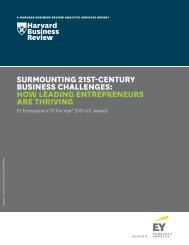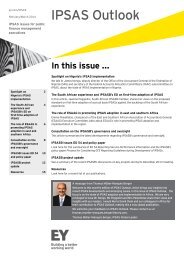Africa 2030: Points of viewThe first relates to the use of Africa’s natural resource rents. Ithas been argued that Africa should use its resource rents to buildinfrastructure that not only improves service provision, but alsomakes it easier to transact business and boost overall investment,especially in rural areas. It is recognised that Africa will not be ableto reach the next level of economic transformation without firstaddressing its serious infrastructure situation.Inadequate power and energy supplies, poor road and railwaynetworks, congested and poorly maintained port facilities andinadequate planning capacities at the government level are blockingprivate investment. This raises the cost of doing business andundermines the capacity required for employment creation. Urbancongestion is today more the rule than the exception in Africancities. Little thinking has gone into planning Africa’s cities of thefuture and how they should operate.Secondly, the continent should take advantage of its demographicdividend to leapfrog development. It is well-known that Africa willhave the youngest population in the world for many years to come.However, to extract the most from this dividend, Africa will needto raise the skills and technical abilities of its young people. Again,the natural resource boom could be used to fund the technologyand innovations required. Youth employment will become a keynecessity for preserving growth and social harmony, and will requireincreased governmental attention.Thus while there is little doubt that Africa is rising, the question thatshould be asked as we look ahead is: ‘Whose Africa is rising?’ Wewill need to ponder how best to bring development benefits to all.For Africa to have a prosperous middleclass by 2030- an aspirationshared by the majority of African countries that have a ‘vision’ forthe future, many more people will need to be economically upliftedso that they can avoid the looming specter of abject poverty. Theymust also be able to enjoy the benefits of a more hopeful and risingAfrica.Thirdly, reforms need to continue in a host of areas to enhanceefficiency and capacity to deliver. It can be argued thatcomplacency is a threat to Africa’s economic improvement. Therelaxation of the fiscal stance may have been necessary during thedifficult times of the financial crisis, but vigilance against escalatingfiscal deficits and rising debts will be required during this presentphase of consolidation and development.Fourthly, Africa must accelerate its plans for economic integration.The process up to now has been too slow, and the costs, in termsof lost trade opportunities and missed markets, have been high.Africa’s hopes of prosperity will not be realised without countriesjoining together to forge economic integration.The subject is a key pillar of the Bank’s work. The trans-boundaryinfrastructure and regional networks, which the Bank has beenfinancing in the past decades, are important for unlocking Africa’spotential and raising its competitive edge against other regions ofthe world. The Bank has estimated that, owing to poor regionalinfrastructure, transport in Africa’s coastal countries costs up to40% more than in comparable countries elsewhere in the world.The transport cost difference for landlocked countries is closeto 100 %. These costs could easily wipe out any other trade orstrategic advantages that Africa could have.Ultimately, Africa’s success will depend on how well it leveragesits comparative advantages and harnesses the key drivers ofgrowth. Raising the level of human development, particularly inscience and technology, will be a ‘game changer’. The expansion ofAfrica’s middle class, one-third of the continent’s total populationis bound to spur developments in a range of areas, some of whichare already evident and include growth of the private sectorand the knowledge economy. The ICT revolution, embraced byAfrica’s youthful population, has spurred innovative approaches toinformation, micro-finance and the mobilisation of rural producersvia the mobile telephone networks. It is expected that this willcontinue propel future growth.Africa’s socio-economic transformation will require enormoushuman and financial resources. Overseas development assistancehas been a key input in Africa’s development, but the goal must nowshift towards home-grown solutions and financing.It is not realistic to expect Africa to be a master of its own future,when the bulk of its major initiatives still depend on donorfinancing. Innovative means of mobilising resources could includetapping into African pension funds, African sovereign wealth funds,and attracting the savings of the African diaspora. During thepast year, the Bank has devised a new financing vehicle ‘Africa50’,dedicated to financing ’game changing’ infrastructure projectsbased on the effective leveraging of public-private partnerships. Thefund is in the process of creating an Africa-wide robust pipeline ofprojects to finance.Ultimately, I am optimistic about Africa’s future. Policy making hasimproved markedly during the last 20 years, most of the continentis at peace, and today’s leaders are conscious of the need for fiscalprudence, sound macro management and the inclusion of the poorin the development process.All of us realise, however, that this is just the beginning. A keychallenge will continue to be effective policy implementation,especially with respect to issues of poverty reduction and socioeconomicinclusion. Even the best of policies will amount to nothingif not subjected to the test of rigorous implementation.56
Seeing the future through the eyes of young AfricansGerald MahindaGerald Mahinda is Managing Director, Sub-Saharan Africa for Kellogg’s, the leading global cerealsand snacks company.It is interesting to reflect on the progress that has been made inAfrica over the past 15 years. Where we are today is very differentto where we were 15 years ago – at that time, most people wouldhave thought it impossible for Africa to get to where it is today.Having traversed the continent working for multinationals over thisperiod, I have had a front row seat to some of the very real changethat has occurred. Ten years ago, when I was living in Lagos, notmany people believed that the transition to democracy in Nigeriawas real, let alone sustainable. Retail options were limited. Therewas only one supermarket where all the expats shopped; drivingaround Lagos, it was rare to see a new car. This has all changed.After four elections, there is real confidence in the sustainability ofthe democratic system and the retail sector has been transformedwith the presence of Shoprite, Spar, Game and Valuemart. Thereare new cars in abundance.Similarly, Luanda is virtually unrecognisable from even a few yearsago. When considering Angola, people often lack the perspectivethat it is little over 10 years since the decades-long civil war drewto an end. The redevelopment that has happened since then isincredible. Luanda is reminiscent of Dubai about 20 years ago andthe city even sports a new, world-class waterfront development.Having said all that, as I continue to travel across the continent,what does strike me is that younger people do not seem asimpressed as my generation with the progress that Africa hasmade, but rather wonder why the continent is not further aheadthan it is.Clearly, they view Africa from a different perspective than mygeneration. The perspective of my generation remains taintedby Africa’s history. Hence there is a sense of wonderment at theprogress that has been made; 15 years ago this would have seemedimpossible to most Africans. At the same time though, because ofour history, there does remain a sense of caution, perhaps evendoubt.In contrast to my generation, the younger generation of Africansare more optimistic and ambitious and they do not suffer fromthe same self-imposed mental limitations. They talk about‘leapfrogging’ the rest of the world rather than simply ‘catchingup’. For us to conceptualise what is possible over the next 15 years,we therefore need to try and see the future through the eyes of ayounger generation that are a lot more visionary than ours.I am not sure exactly what the future of Africa is going to look like,but I do believe that the younger generation will drive fundamentalchanges. Looking through their eyes, the past 15 years have beentransitional and the next 15 years will be transformational. Theyare going to create a different set of demands, opportunities andenablers. The ‘old politics’ of Africa will simply not work for them.The new generation will demand governance and accountabilityand see new systems being used to create a different kind of civilsociety and a different form of government. In the same way thatmobile telephony is transforming communications, transactionalrelationships, and even social and political dynamics, newtechnologies are going to force a ‘recalibration’ of commerce andpolitics in Africa.In the context of my working life in Africa – 20 odd years withmultinationals AIG, Standard Chartered, and now Kellogg’s – I ammore convinced than ever that the single biggest constraint to thegrowth of multinationals like these in Africa is perspective.Like my generation of Africans, the general perspective is groundedin the history. We need to radically shift this by imagining whatcould be possible in 15 years’ time, rather than being continuallyweighted down by where we were 15-20 years ago.Although it is difficult to visualise this future, I do know that ouronly constraint – as Africans and as leaders - is a going to be lack ofimagination and willingness to think differently.Africa 2030: Realizing the possibilities57





